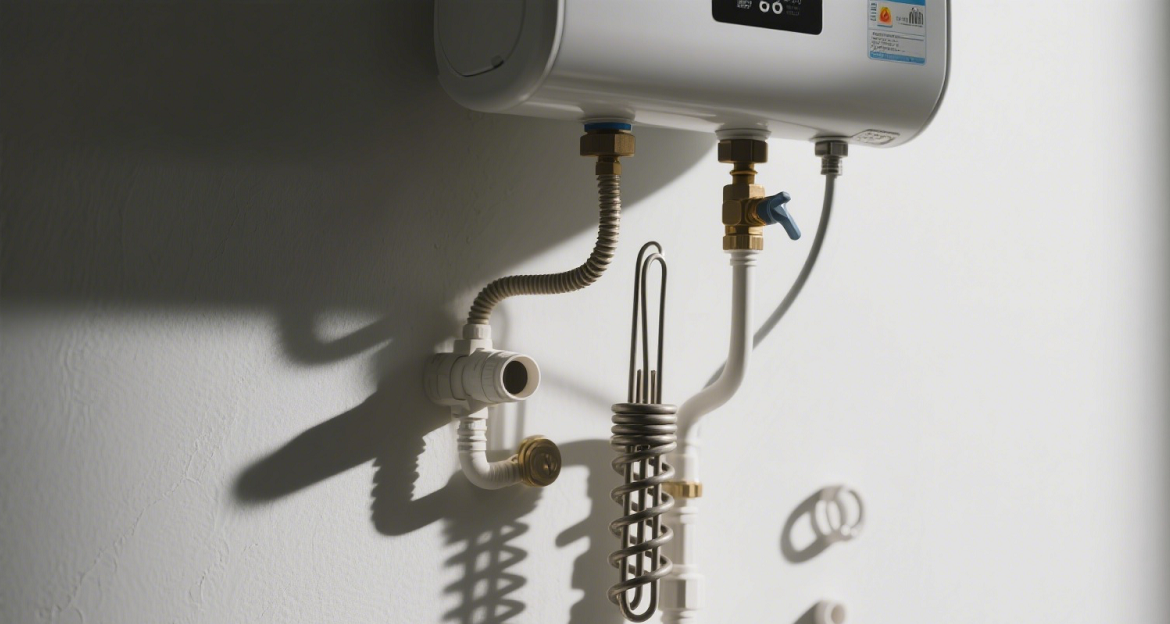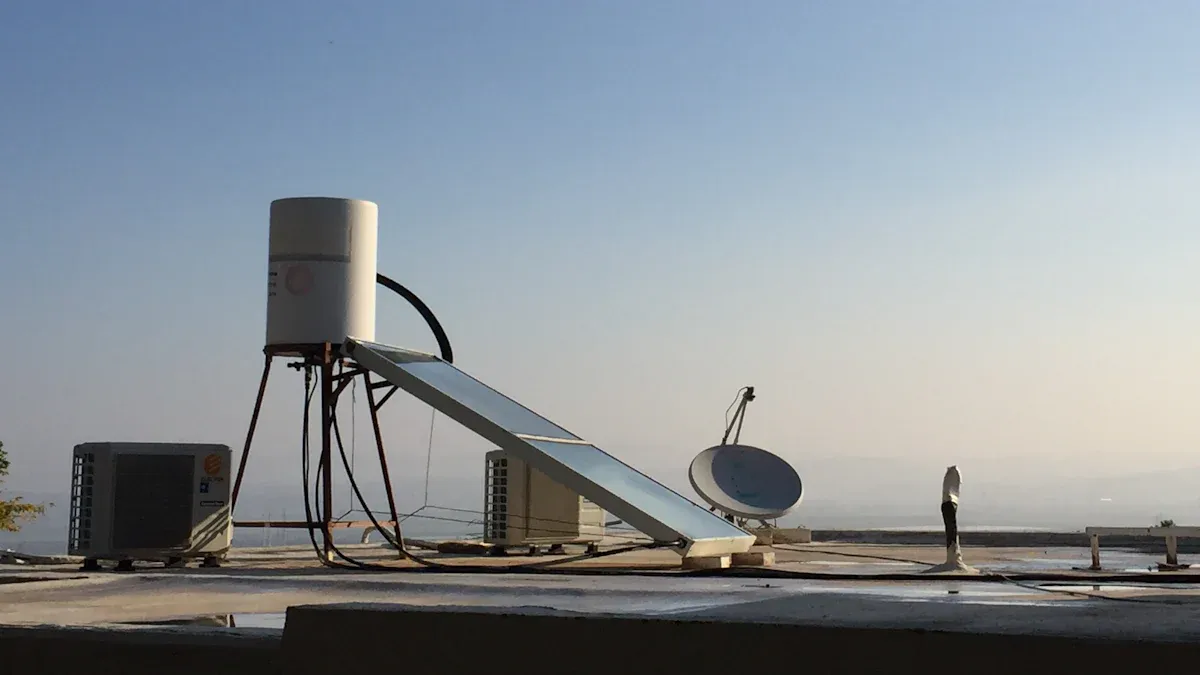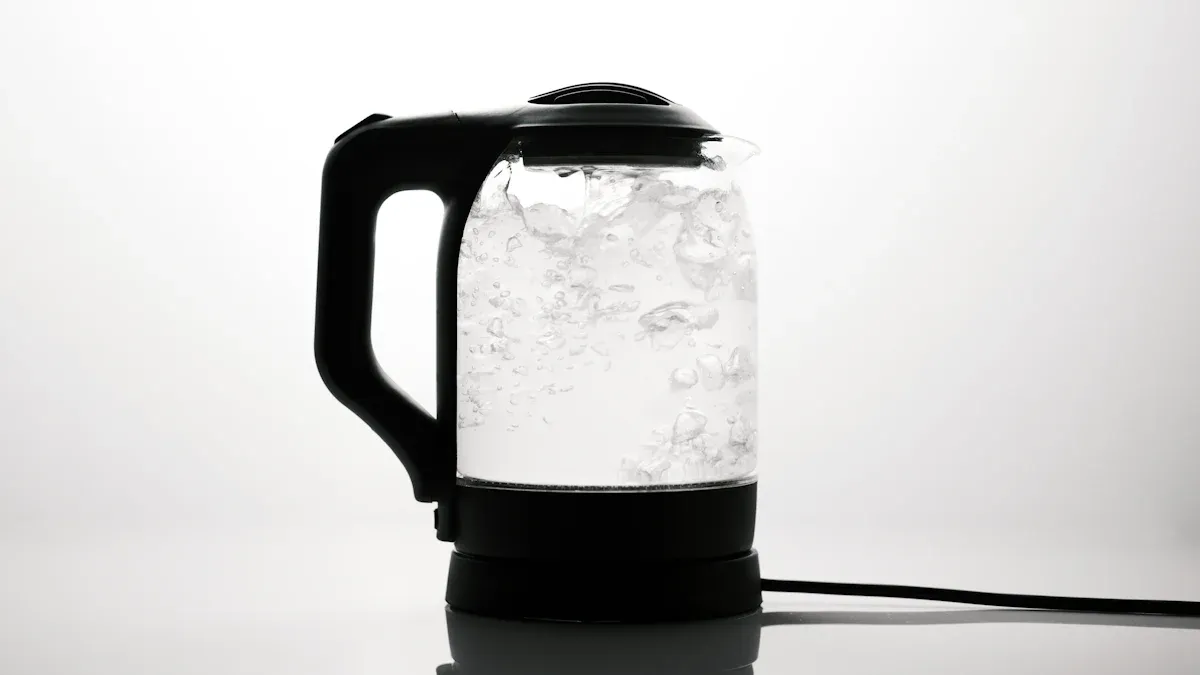
Choosing the right water heater heating element is crucial for every home. Homeowners seek a durable water heater element with the correct wattage and high efficiency. The water heater electric market continues to expand, featuring new smart water heater models and improved designs.
| Aspect | Details |
|---|---|
| Market Size | $59,106.6 million (2023) |
| Growth Drivers | Efficiency, instant heating, technology |
Key Takeaways
- Choose water heater elements made from high-quality materials like stainless steel or ceramic to ensure long-lasting performance and resistance to rust and corrosion.
- Match the element’s wattage, voltage, and size to your water heater model to avoid damage and ensure efficient heating.
- Maintain your water heater regularly by flushing the tank, checking the anode rod, and considering water quality to extend the element’s lifespan and save on energy costs.
Water Heater Element Performance Criteria

Heating Speed
Heating speed matters when people want hot water fast. A water heater element with a higher wattage usually heats water more quickly. Homeowners often notice the difference when they run a shower or fill a bathtub. The design and material of the element also play a role. Some elements transfer heat better, so water reaches the desired temperature sooner.
Tip: If a family uses a lot of hot water at once, they should look for a water heater element with a fast heating speed.
Energy Efficiency
Energy efficiency helps save money and reduces waste. Efficient water heater elements use less electricity to heat the same amount of water. This means lower energy bills and less impact on the environment. Some systems, like heat pump water heaters, can cut electrical demand by half compared to standard electric models. The coefficient of performance (COP) shows how well a system turns energy into heat. For example, heat pump water heaters often have COP values between 1.8 and 2.5, while electric resistance heaters have a COP around 0.95.
| Water Heater Configuration | System Coefficient of Performance (COPsys) |
|---|---|
| Dual-tank system (solar thermal preheat + HPWH) | 2.87 |
| Heat pump water heater alone | 1.9 |
| Baseline electric resistance water heater | 0.95 |
This table shows that using advanced technology, like solar preheating or heat pumps, can make a big difference in efficiency.
Wattage and Voltage Ratings
Wattage and voltage ratings tell users how much power a water heater element needs. Most home water heaters use elements rated at 120 or 240 volts. The wattage can range from 1,500 to 5,500 watts. Choosing the right rating ensures the element works safely and heats water properly. If someone picks an element with the wrong rating, it might not fit their system or could even cause damage.
Note: Always check the water heater’s label or manual before buying a new element.
Compatibility with Water Heater Models
Not every water heater element fits every model. Compatibility depends on the size, shape, and connection type. Some elements are straight, while others are folded or have special threads. Using the wrong element can lead to leaks or poor performance. Homeowners should match the element to their water heater’s brand and model number.
When comparing elements, experts often look at these numerical performance metrics:
- Reynolds number: Shows how water flows around the element.
- Nusselt number: Measures how well the element transfers heat.
- Friction factor: Tells how much resistance the water faces.
- Thermal performance factor: Rates the element’s overall heating ability.
These numbers help engineers design better elements and improve efficiency.
Water Heater Element Durability Factors
Material Quality (Metal vs. Ceramic)
Material quality plays a big role in how long a water heater element lasts. Most elements use either metal or ceramic materials. Metal elements, often made from copper or stainless steel, heat up quickly and cost less. However, they can wear out faster if the water has lots of minerals or is very acidic. Ceramic elements resist corrosion better. They have a protective coating that keeps water from touching the metal inside. This helps them last longer, especially in places with hard water. Some high-end models use a porcelain casing to protect against rust and mineral buildup. When choosing between metal and ceramic, people should think about their water quality and how long they want the element to last.
Corrosion and Scale Resistance
Corrosion and scale are two main enemies of water heater elements. Corrosion happens when water reacts with metal, causing rust and weak spots. Scale forms when minerals in hard water stick to the element, making it work harder and wear out faster. Studies show that water hardness leads to mineral buildup inside heaters, which can clog pipes and lower efficiency. Corrosion can cause leaks and damage that are hard to fix. Some elements have self-cleaning features or special coatings to fight these problems. For example, porcelain or glass-lined elements help stop rust. Experimental tests show that corrosion rates stay low under certain conditions, but high temperatures and poor water quality can double the damage. People who live in areas with hard water or high temperatures should look for elements with strong corrosion and scale resistance.
Tip: Regular maintenance, like flushing the tank and checking the anode rod, helps prevent scale and corrosion.
Warranty and Manufacturer Reputation
A good warranty often means the manufacturer trusts their product to last. Consumer studies link longer warranties (like 9-12 years) with better construction and higher quality. Brands with strong reputations usually offer thicker insulation and larger heating elements, which help the unit last longer. When shopping for a water heater element, people should check the warranty details and look for brands known for quality. A longer warranty can save money on repairs and replacements down the road.
| Warranty Length | What It Suggests |
|---|---|
| 6 years | Basic quality, shorter lifespan |
| 9-12 years | Superior build, longer life |
Lifespan Expectations
Most water heaters last between 8 and 12 years, but some well-maintained units can work for over 15 years. Electric water heaters tend to last longer than gas models because they have fewer parts exposed to flame. Tankless water heaters can last 20 years or more if people take care of them. The lifespan of a water heater element depends on several things:
1. Quality of the unit and materials 2. Proper installation and sizing 3. Regular maintenance, like flushing and anode rod checks 4. Water quality (hard water shortens life) 5. How much hot water the household uses 6. Environmental factors, such as moisture or outdoor exposure 7. Type of water heater (tankless models often last longer)
People can spot a failing element if the water turns lukewarm or the thermostat stops working. Keeping up with maintenance, like flushing the tank and replacing worn parts, helps the element last as long as possible.
Comparing Water Heater Elements

Side-by-Side Feature Comparison
When comparing water heater elements, people often want a clear way to see which one works best. Experts use data-driven methods to make these comparisons fair. They collect real-world data from many homes and use machine learning models to predict how each element will perform. These models, like LightGBM and LSTM, look at things such as how fast the water heats up, how much energy it uses, and how often it needs repairs. The process includes cleaning the data, picking out important features, and testing each model on the same set of information. This helps show which water heater element stands out in real-life situations, not just in the lab.
Pros and Cons of Popular Water Heater Element Models
Different types of water heaters have their own strengths and weaknesses. Here is a quick look at two popular models:
| Aspect | Tankless Water Heaters | Conventional Storage Water Heaters |
|---|---|---|
| Energy Efficiency (≤41 gal/day) | 24%–34% more efficient | Baseline |
| Energy Efficiency (~86 gal/day) | 8%–14% more efficient | Baseline |
| Typical Lifespan | More than 20 years | 10–15 years |
| Standby Heat Loss | None | Present |
| Initial Cost | Higher | Lower |
Tip: Tankless models save energy and last longer, but they cost more up front. Storage heaters cost less but may waste more energy over time.
Reading User Reviews and Ratings
User reviews and ratings give real insight into how a water heater element performs day to day. Lab tests show that tankless water heaters can use up to 8.8% more energy under real-life use than in standard tests. People who use these heaters often mention how the number and length of hot water draws affect performance. In one study, homes averaged 26 hot water draws per day, with each lasting about a minute. Models that handle these patterns well get higher ratings. Some reviews also mention how well the heater keeps up with demand and how much money it saves on energy bills. These details help buyers choose a model that fits their needs and usage habits.
Common Pitfalls When Choosing a Water Heater Element
Overlooking Compatibility
Many people forget to check if a new heating element fits their water heater. They might see a good deal and buy it right away. Later, they find out the part does not match the size or shape of their tank. Some elements have different threads or lengths. Others need a certain voltage. If someone installs the wrong part, it can cause leaks or even damage the heater. Always check the model number and read the manual before buying.
Ignoring Water Quality
Water quality can change how long a heater lasts. Hard water has more minerals. These minerals build up on the heating element and make it work harder. Over time, this can cause the element to fail. People who live in areas with hard water should look for elements with special coatings or self-cleaning features. Regular maintenance, like flushing the tank, also helps. Ignoring water quality can lead to more repairs and higher costs.
Choosing Based on Price Alone
Some shoppers pick the cheapest option and hope for the best. Surveys from Japan, Germany, and China show that price matters, but it is not the only thing people care about. Other important factors include:
- Energy efficiency
- Government rebates or grants
- Environmental impact
- Comfort and ease of use
- Advice from friends or family
When energy prices go up, people often choose more efficient heaters, even if they cost more at first. Focusing only on price can mean missing out on energy savings and comfort. It can also lead to higher bills over time.
Water Heater Element Selection Recommendations
What to Prioritize for Performance and Durability
When picking a new heating element, people should focus on a few key things. First, they should look for high-quality materials. Stainless steel and ceramic last longer and resist rust better than cheaper metals. Next, they should check the wattage and voltage. The right match keeps the heater safe and efficient. Compatibility matters, too. The element must fit the water heater’s brand and model. A good warranty can also show that the maker stands behind the product. People should read reviews to see how the element works in real homes. If the area has hard water, it helps to choose an element with a special coating or self-cleaning feature. These steps help make sure the heater works well and lasts a long time.
Tip: Always check the water heater’s manual before buying a new element. This helps avoid mistakes and saves time.
Best Practices for Long-Term Use
People can make their heating elements last longer by following some simple habits:
- Drain and flush the tank often to remove sediment and minerals.
- Inspect and replace the anode rod to stop rust and corrosion.
- Use a water softener or filter if the water is hard.
- Keep the temperature around 122°F to reduce wear.
- Insulate the tank and pipes to keep heat in and lower the element’s workload.
- Schedule regular check-ups with a professional to catch small problems early.
- Make sure the element is installed correctly to prevent leaks.
These habits help the heater run better and save money on repairs.
When choosing a new heater element, people should check the material, wattage, and warranty. They can compare different models side by side. Reading reviews helps avoid mistakes. > Remember, picking the right fit means fewer problems and steady hot water at home.
FAQ
How often should someone replace a water heater element?
Most people replace the element every 6 to 10 years. Hard water or heavy use may shorten this time.
Can a homeowner install a water heater element without a plumber?
Yes, many homeowners install elements themselves. They should always turn off power and follow the manual for safety.
What signs show a water heater element is failing?
Water turns lukewarm, or hot water runs out fast. Sometimes, the heater makes strange noises or trips the breaker.
Post time: Jun-18-2025




